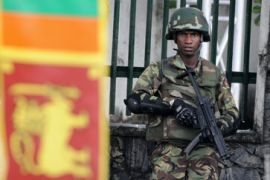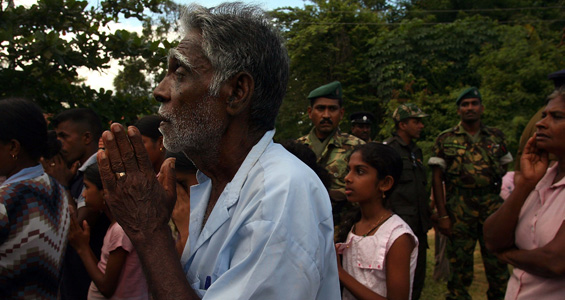Fighting impunity in Sri Lanka
Rights groups call for full independent investigation into alleged abuses during war.

 |
| Civilians were targeted during the final stages of the civil war, rights groups say [GALLO/GETTY] |
A year has passed since Sri Lanka declared victory in its long, bloody civil war against the Liberation Tigers of Tamil Eelam (LTTE). The island nation might be formally united for the first time in decades, but the brutal methods used to win the conflict have cast a shadow over Sri Lanka’s new found peace.
A year after the guns fell silent in northern Sri Lanka, human rights groups have issued their strongest call yet for a full and independent inquiry into alleged war crimes committed by both sides during the final months of the conflict.
Evidence of major abuses collected by the International Crisis Group (ICG) and Amnesty International makes for grim reading, with Sri Lankan government forces accused of intentionally shelling civilians, bombing hospitals and food distribution points, and opening fire in declared no-fire zones in its efforts to stamp out the Tamil insurgency.
The human rights groups say that abuses were committed by both sides, but with most of the LTTE leadership dead, it is the Sri Lankan government that has come under most scrutiny for what observers say were clear violations of the laws of war in its final, bloody crackdown on the rebels.
“Evidence gathered by the International Crisis Group suggests that these months saw tens of thousands of Tamil civilian men, women, children and the elderly killed, countless more wounded, and hundreds of thousands deprived of adequate food and medical care, resulting in more deaths,” the ICG report says.
“Starting in late January [2009], the government and security forces encouraged hundreds of thousands of civilians to move into ever smaller government-declared no-fire zones and then subjected them to repeated and increasingly intense artillery and mortar barrages and other fire.”
Hospital attacks
The organisation has also uncovered reports of hospitals crammed with wounded civilians coming under fire.
“The security forces shelled hospitals and makeshift medical centres – many overflowing with the wounded and sick – on multiple occasions even though they knew of their precise locations,” the report says.
| IN DEPTH | ||||||||||||

|
The Sri Lankan government had no comment on the allegations when contacted by Al Jazeera, but in the past officials have refused to countenance any investigation into the alleged war crimes, claiming to have run a “zero-casualty policy” during the final months of the conflict and insisting that there is no need for an inquiry.
The comments of Gotabaya Rajapaksa, Sri Lanka’s defence secretary, have been typical of the government’s response to allegations that it did anything wrong during the war.
“Whether it is the United Nations or any other country, we are not – I am not – allowing any investigations in this country,” he said in February. “Nothing wrong happened in this country. Take it from me.”
But a compelling counter-narrative of the conflict has emerged that contradicts official version of events and places partial responsibility for the civilian suffering in Sri Lanka on the international community.
International blame
“Much of the international community turned a blind eye to the violations when they were happening. Many countries welcomed the LTTE’s defeat regardless of the cost of the immense civilian suffering and acute challenge to the laws of war,” the ICG says.
Amnesty International has also been heavily critical of the international community’s response to the conflict.
“The UN never revealed what it knew about the final days of conflict, acknowledged the scale of the abuse that took place or pushed for accountability,” says Madhu Malhotra, the group’s deputy director for the Asia-Pacific region.
Both groups believe that a failure to act undermines the credibility of the international laws governing conflict.
“The scale of civilian deaths and suffering demands a response,” says Louise Arbour, the ICG president.
“Future generations will demand to know what happened, and future peace in Sri Lanka requires some measure of justice.”
The idea that crimes would go unpunished in Sri Lanka could have encouraged abuses, the groups warn.
“At the end of the war, atrocities against civilians and enemy combatants appeared to be fueled by a sense that there would be no real international consequences for violating the law,” Malhotra says.
But the stakes of future inaction could be even higher.
“A number of countries are considering ‘the Sri Lankan option’ – unrestrained military action, refusal to negotiate, disregard for humanitarian issues, keeping out international observers including the press and humanitarian workers – as a way to deal with insurgencies,” the report says.
“There must be a concerted effort to investigate alleged war crimes by both sides and prosecute those responsible.”